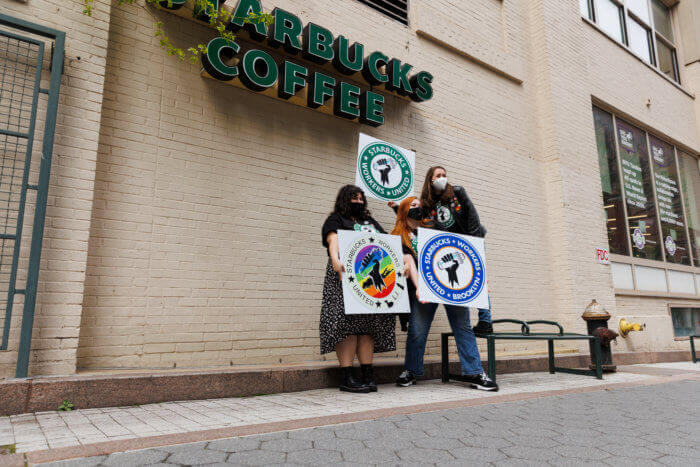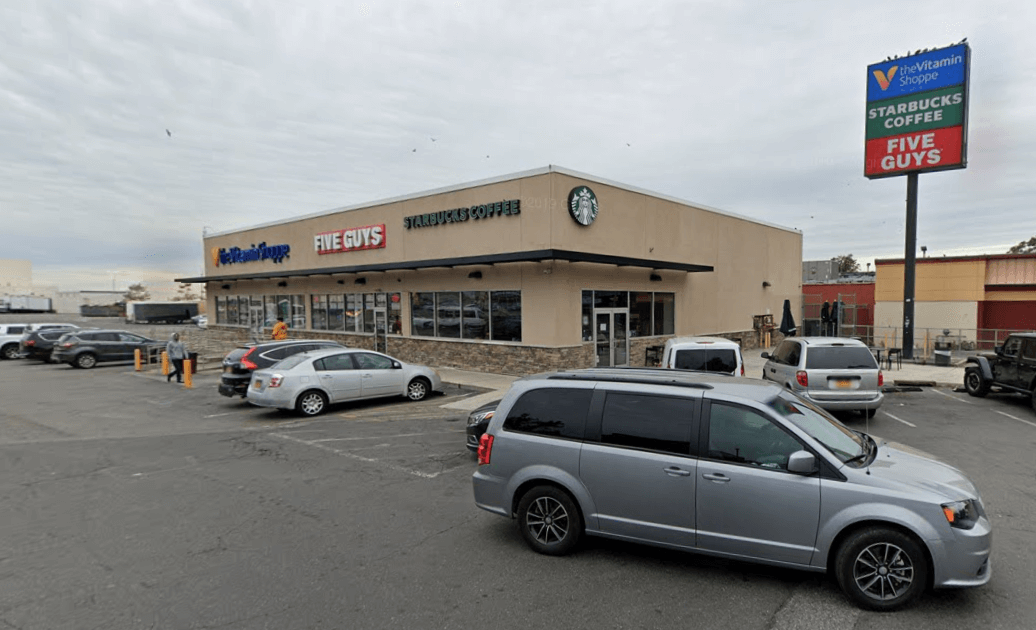Bath Beach Starbucks Becomes First Brooklyn Store in the Coffee Chain to Unionize
Starbucks employees at the store in Bath Beach’s Ceasar’s Bay Shopping Center have formally voted to unionize, becoming the first store in Brooklyn and the third in New York City to join the fast-growing nationwide labor movement.

Ceasar’s Bay union organizers Megan DiMotta, left, and Elizabeth Kurchak speak outside the NLRB office shortly after winning their union election. Photo by Paul Frangipane
Starbucks employees at the store in Bath Beach’s Ceasar’s Bay Shopping Center have formally voted to unionize, becoming the first store in Brooklyn and the third in New York City to join the fast-growing nationwide labor movement among the ubiquitous coffee company’s 350,000 workers.
The 17 employees, or “partners” in Starbucks company lingo, voted unanimously to join Starbucks Workers United, which began its organizing campaign in Buffalo last year and has quickly gained steam throughout the country. Ceasar’s Bay joins more than 50 stores nationwide now in the union, with about 250 having filed petitions for an election, even as the company has undertaken a nationwide union-busting campaign.
Ceasar’s Bay workers join their colleagues at the Reserve Roastery in the Meatpacking District and the store at Astor Place in Greenwich Village, both of which have already voted to unionize.
“I think [unionizing] is gonna better partners’ relationship with the company,” said Megan DiMotta, an 11-year Starbucks vet and a union organizer at the Ceasar’s Bay store, outside the National Labor Relations Board office in Downtown Brooklyn following the vote. “I think it will rebuild the trust that they keep claiming they’re going to rebuild for us. I think that our union is going to do that, I think that’s why it’s important.”

Two stores in Astoria have also filed to form a union. Partners at a store in Massapequa, Nassau County also voted to join the union on Tuesday; those in Great Neck were unsuccessful in their efforts.
Employees at Ceasar’s Bay have said they sought to form a union after enduring frequent harassment and sometimes even assault from customers throughout the pandemic as they were made to enforce vaccination and masking requirements, with little to no support coming from corporate honchos.
“We would write incident reports and nothing would be done,” DiMotta said. “I think the union is going to be help us be able to protect ourselves in that way, because we’ve been doing that. This is going to be the move to it.”
They also want to form a union to stand up to what they deem exploitative practices by management, such as scheduling workers with short enough hours that they don’t legally have to provide them with breaks, and also are seeking wages that don’t leave partners struggling to pay bills each month. Elizabeth Kurchak, a fellow Ceasar’s Bay employee and union organizer, said that she was onboarded at the store last year with a wage of just $15.55 per hour.
“We don’t need a new coffee blend,” Kurchak said. “We need better wages.”
The company has said throughout the unionization drive that it believes a “direct” relationship with employees is best for both management and workers, and has denied claims that it is interfering in its employees’ right to organize.
“We are listening and learning from the partners in these stores as we always do across the country,” a Starbucks spokesperson said in a statement. “From the beginning, we’ve been clear in our belief that we are better together as partners, without a union between us, and that conviction has not changed. We respect our partners’ right to organize and are committed to following the NLRB process.”
But across the country, Starbucks has fired organizing employees, surveilled stores where workers filed to unionize, and applied substantial pressure on employees to vote against joining the union, according to workers. Dozens of employees have filed complaints with the NLRB against the company in recent months.
“We’ve all dealt with a lot of union busting, retaliation, just being watched,” DiMotta said. “They’ve been saying a lot about how union busting isn’t happening, which is a lie.”
At Ceasar’s Bay, employees say they were forced to attend anti-union “captive audience meetings” and one-on-one “chats.” DiMotta said she and another union organizer saw their hours cut, which the company justified by onboarding new colleagues the week they filed with the NLRB. Managers began to mete out discipline for minor infractions more often, and regional managers began to show up at the store to watch employees work.
The store was closed or shut down on 12 separate occasions by corporate during the union drive, workers said. The company claimed that was due to short staffing when workers tested positive for Covid, but DiMotta said that in normal circumstances workers at other stores would be shifted to fill in vacancies, but that the company may not have wanted partners elsewhere to speak with unionizing workers at Ceasar’s Bay.

Managers even left an anti-union speech by Starbucks CEO Howard Schultz (a Canarsie native) playing on the computer in the break room, DiMotta said. Schultz said at a town hall last month that the company is being “assaulted” by the specter of unionization.
Union-busting became so intense at the store that City Council Member Justin Brannan, who reps the area and is himself a former union shop steward, sent a letter to Schultz in April demanding he cease interfering.
On Tuesday, Brannan lauded Ceasar’s Bay employees on their successful union drive.
“I am so incredibly proud of these courageous workers who fought to unionize the very first Starbucks in Brooklyn just a few miles from where CEO Howard Schultz forgot he grew up,” Brannan said in a statement. “The deck was stacked against these workers from the start but they never flinched, they never wavered. At a time of record profits, Starbucks can afford to pay decent wages and to treat their workers with dignity and respect.”
“It shouldn’t take such bravery to stand up for basic workplace rights,” Brannan continued. “This didn’t need to be a war but we will never forget that it was. Anyhow, who’s next?”
Now that they’re unionized, the next step is negotiating a contract with management. That will begin in seven days, workers say.
“This is just going to make all of our partners feel unified in a way that will help us be strong for negotiations,” DiMotta said. “I think it’ll be good.”
Editor’s note: A version of this story originally ran in Brooklyn Paper. Click here to see the original story.
Related Stories
- Construction Worker Collective Memorializes Those Lost on the Job, Offers Safety Training
- Brooklyn Racked Up the Most Construction Violations in NYC in 2021, Says DOB Report
- Tenants of Greenbrook Partner Properties Organize Against Rent Hikes
Email tips@brownstoner.com with further comments, questions or tips. Follow Brownstoner on Twitter and Instagram, and like us on Facebook.









What's Your Take? Leave a Comment